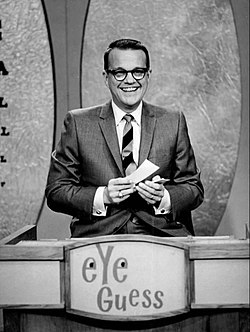Eye Guess
| Eye Guess | |
|---|---|

Host Bill Cullen, 1966.
|
|
| Created by | Bob Stewart |
| Presented by | Bill Cullen |
| Narrated by |
Don Pardo (1966–1967) Jack Clark (1967–1969) |
| Theme music composer | Billy Sherrill and Buddy Killen ("Sugar Lips" performed by Al Hirt) |
| Country of origin | United States |
| No. of seasons | 4 |
| Production | |
| Camera setup | Multi-camera |
| Running time | 22–24 minutes |
| Production company(s) |
Bob Stewart Productions Filmways Television |
| Distributor | Columbia TriStar Domestic Television Columbia TriStar Television Sony Pictures Television |
| Release | |
| Original network | NBC |
| Audio format | Monaural |
| Original release | January 3, 1966 – September 26, 1969 |
Eye Guess is an American game show created by Bob Stewart and hosted by Bill Cullen, which aired on NBC from January 3, 1966 to September 26, 1969. The game combined a general knowledge quiz with a Concentration-style memory element, where the answers were shown to the players and their recall of their positions was tested.
This was the first game show by Bob Stewart Productions. Stewart, a former producer for Goodson-Todman Productions, created this series and packaged it with Filmways. Don Pardo announced for the first year, after which Jack Clark replaced him for the rest of the run.
The show used the Al Hirt tune "Sugar Lips" as its theme song.
Two contestants faced a nine-space game board, divided into three rows of three boxes. The outer boxes were numbered 1–8, and the center box contained the "Eye Guess" logo. At the beginning of the game, the answers hidden behind the outer boxes were revealed for six to nine seconds and then re-covered. Questions were asked by the host, and contestants were required to provide only the number behind which the answer was hidden. Points were awarded for a correct answer, and the contestant who responded correctly was asked a bonus question for additional points. If the bonus question was missed, that contestant's turn ended and the opponent was asked the next question.
A contestant could call for the "Eye Guess" space if they thought that the correct answer was not among the eight choices revealed at the start of the game. In such instances, the answer would be revealed only if it was correct for that question. Otherwise, a blank card would be revealed.
Questions in each round covered a wide range of topics and were assembled in such a way that choosing an incorrect number for a question could yield humorous results, which was the main appeal of this otherwise simple game.
Each game consisted of two rounds, with correct answers worth 10 points on the first round and 20 on the second. Although there were nine different answers per round, each round only featured eight questions, meaning one of the nine answers was not used (and never placed behind the "Eye Guess" space). A contestant who provided five consecutive correct answers won a bonus prize, usually a trip. Toward the end of the show's run, contestants who both missed four consecutive questions in the main game each received a series of at-home memory-improvement books.
...
Wikipedia
